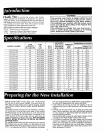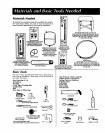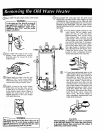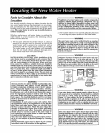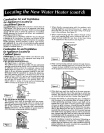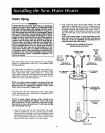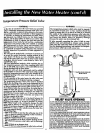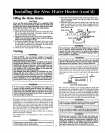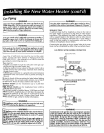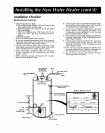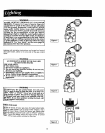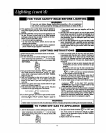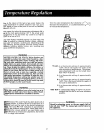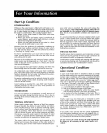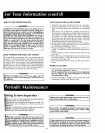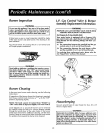
Gas Piping
WARNING
Make sure the gassuppl!ed is the same type listed on the
model rating plate./ne Jme[ gaspressuremust not exceed 14
inches water column [I/2 pound per square inch (3.5kPa)].
The minimum inlet gas pressure listed on the model rating
plate isfor the purpose of input adjustment.
WARNING
If the gas control valve is subjected to pressuresexceeding '/2
i pound-per square inch (3.5kPa), the damage to the gas con-
|rol valve could result in a fire or explosion from leak|ng gas.
WARNING
If the main gasline shutoff serving all gas appliances is used,
alsoturn "OFF" the gasat each appliance. Leave all gasappli-
ancesshutoH until the water heater installation is complete.
L
A gas line of sufficient size must be run to the water
heater. Consult the latest edition of National Fuel Gas
Code ANSI Z223.1, also referred to as NFPA54 and the
gas company concerning pipe size.
There must be:
-A readily accessible manual shut off valve in the gas sup-
ply line serving the water heater, and
"A drip leg (sediment trap) ahead of the gas control valve
to help prevent dirt and foreign materials from entering
the gas control valve.
"A flexible gas connector or a ground joint union between
the shutoff val_,e and control valve to permit servicing of
the unit.
Be sureto check all the gas piping for leaks before lighting
the water heater. Use a soapy water solution, not a match
or open flame. Rinse off soapy solution and wipe dry.
Standard Models are for installation up to 3,300 feet
above sea level.
High Altitude Models are for installation from 3,300 to
5,500 feet above sea level.
Ifa standard model is installed above 3,300 feet or a high
altitude model is installed above 5,500 feet, the input rat-
ing must be reduced at the rate of 4 percent for each
1,000 feet above sea level. Contact your local Sears
SeWice Center or gas ut I ty for further information.
..... WARNING
i,The appliance and its gas connection must be leak test- I
Led before placing the appliance in operation,
I
, WAR N IN G
appliance and its individual shutoff valve must be discon-
|ned_ from the gassupply piping systemduring any pressure
llesting of that systemat test pressures in excessof' I/2pound
_square . .
ll_ appliancemust be isolated from the gassupplypiping sys-
inch
(3.5kPa).
Jte_n_by closing its individual manual shutoff valve during any
Ipressure testing of the gassupply piping system at test pres-
qual to or lessthan 1/2pound per square inch (3.5kPa).
13
WARNING
I se pipe joint compound or teflon tape marked as being|
resistant to the action of petroleum [Propane (L.P.)] gases.
!
SEDIMENT TRAP
A sediment trap shall be installed as close to the inlet of
the water heater as practical at the time of water heater
installation. The sediment trap shall be either a tee fitting
with a capped nipple in the bottom outlet or other device
recognized as an effective sediment trap. If a tee fitting is
used, it shall be installed in conformance with one of the
methods of installation shown below.
Connecting the gaspiping to the gas control valve of the water
heatercan beaccomplishedby either ofthe two methodsshown.
GAS PIPING WITH FLEXIBLE CONNECTOR
_[_GAS SUPPLY PIPING
MANUAL IlK I
SHUTOFF ] I[_
VALVE _J__
FLEXIBLE GAS CONNECTOR
LABELED AS COMPLYING
WITH ANSI STANDARDS
GROUND JOINT
UNION (Optional)
T
6. DRIP LEG
(Sediment trap)
CAP
GAS
CONTROL
VALVE
GAS PIPING WITH ALL BLACK IRON PIPE
TO GAS CONTROL
GAS SUPPLY PIPING
MANUAL]_- I
SHUTOFFll_Ll
VALVE _
"-_ BLACK PIPE
GROUND JOINT [t:::_ I
UNION.._ _ GAS
CONTROL
VALVE
6" I J DRIP LEG
H (Sediment trap)
CAP
WARNING
Contaminants in the gas lines may causeimproper operation
of the gas control valve that may result in fire or explosion.
Before attaching the gasline be sure that all gaspipe is clean
on the inside. "to trap any dirt or foreign material in the gas
supplyline, a drip leg (sometimes caged a sediment trap)
mustbe incorporated-in the piping. The drip leg must De
readily accessible. Install in accordance with the "Gas
Piping_ section. Refer to the latest edition of the National
Fuel Gas Code, ANSI Z223.1, also referred to as NFPA54.



